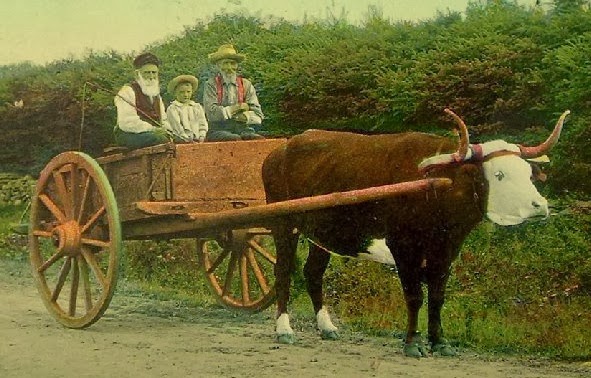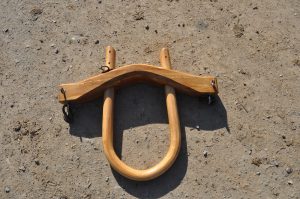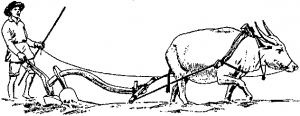Taking On Christ’s Yoke: A Fresh Perspective

Come to me all who labor and are heavy laden, and I will give you rest. Take My yoke upon you and learn from Me, for I am gentle and lowly in heart, and you will find rest for your souls. For My yoke is easy and My burden is light. (Matthew 11.29-30)
[featured-image single_newwindow=”false”]These familiar and well-loved words from Jesus are cherished by many Christians. Jesus’ invitation with its promise of “rest,” draws many to come to Him, take up

His yoke, and learn from Him. We can easily understand what it is to come and learn. But when Jesus uses the word “yoke” without comment, the reader is left a bit befuddled as to its meaning. Jesus does not literally wear a yoke around His neck. So He must mean something else; it must be a metaphor. But, a metaphor of what?
What is a “yoke?”
Literally, a yoke is a wooden frame joining two animals (usually oxen). There is such a thing as a single yoke, too.
Metaphorically, a yoke describes any number of ideas as we will see below.
Explanations of Christ’s Yoke
On a Church of Christ website, Bailey McBride interprets the “yoke” to be some kind of force that enables us to defeat our immoral passions, helps us address our stubborn hearts, and provides an instrument of discipline. It is a powerful guide for our thoughts and actions, shapes us in the image of Jesus, and equips us to “deal with egos that drive us to all kinds of accesses.”
Wow! I think he’s covered all the bases. Or has he?
According to a Mormon website the yoke means, “To humbly do his will and allow him to guide and direct our lives.”
“Take my yoke,” according to John Wesley means to “believe in me: receive me as your prophet, priest, and king.”
A writer in Ellicott’s Bible Commentary says, “the yoke of Christ is His teaching, His rule of life.”
Meyers claims the yoke is “His guidance and discipline, to which they are to subject themselves through faith in Him.”
A writer of Expositor’s Greek Testament says Jesus is referring to his disciples taking Jesus as their “Master in religion.”
Barnes says that the yoke “refers here to the religion of the Redeemer; and the idea is, that they should embrace his system of religion and obey him…and the Saviour here means to say that the restraints and laws of his religion are mild, and gentle, and easy.” Jesus still has laws and requirements but they are easy and light.
“The yoke is the service that Christ gives us to do, and therefore implies more than his teaching.” (Barnes’ Notes on the Bible)
The yoke is a submission to an occupation or obligation. “by the coming of the Saviour, they would first take on them the yoke of the kingdom of heaven, and then that of the commandments, finding this yoke easy and the burden light.” (Vincent’s Word Studies)
“To take Christ’s yoke means to submit oneself to the authority of Christ. It means to put ourselves under his rule, to join together with him. He is inviting people to put their shoulders into a new yoke, one in which he is the yoke mate. And he promises that, as they submit to his authority and are yoked with him, they will find rest for their souls.” Dr. J. Dwight Pentecost
Benedictine monk Br. Francis de Sales Wagner writes:
So then, what precisely is the yoke of Christ for us? It is the vehicle of grace on the path of life by which we progressively and obediently come to know, love, and serve God. It means being a disciple of Christ, being true to one’s vocation in life—which may be lived out in many different ways.This yoke, this right mind of obedience under the law of freedom, this Love, is symbolized in different ways for those living out other vocations. It may be a wedding ring, or a clerical collar, or it may be something less visible but no less demanding—such as an illness, loneliness, or other difficult circumstances.
Yoke = Weed?
It’s surprising what one finds on the internet. Here is Ras SpiritLeaf’s take on “yoke:” https://spiritleafministries.org/articles/2-take-my-yoke-upon-you
When we take Hemp (Cannabis) upon ourselves in this way we are yoked to JahShua’s Father (Jah) and this is how he brings forth judgement unto truth (enables every individual to know what Jah is saying directly without any need for an intermediary). Anxiety is relieved as the external noise is quieted. Intermission and recreation and judgement unto Truth are found… via our breath. This is how Jah governs man. Yoke yourself so you yourself know… and the external controls, religious and otherwise, are replaced by what you now know as Jah reveals directly to you (babes; common folk) via his yoke. Your anxiety and stress dissolve as you know and are known by Jah. Your life is preserved / health is restored. This is the result of “knowing” Jah:
HEMP is Jah’s government for the minds of men and his sustainable provision for every need. This is why Jahshuah instructed us to take it upon ourselves. Us… the people; the common folk. He did not instruct a leadership of any sort to manage this for us. He didn’t consult the reigning authorities. He understood separation of church and state. It isn’t up to any earthly authority. It is mandated by JahShua directly to The People to take his yoke (Hemp) upon themselves and via this sacramental practice find rest in our breath.
The NIV Study Bible has no note on Christ’s yoke.
The Life With God Bible (NRSV) indicates that the yoke is wisdom unlike the Torah. “Jesus is offering his yoke, which involves both old and new teachings, not simply the yoke of the Mosaic law…Jesus’ person, life, and teaching are the climactic expression fo God’s wisdom and will.”
The Orthodox Study Bible relates that “Jesus’ yoke is submission to the Kingdom of God. A yoke could be seen as a sign of hardship, burdens, and responsibilities…but in Christ, the yoke is easy, for the power of God works in each person.”
St. Theophan the Recluse writes:
A soul desiring to be saved from sins knows what to say to the Lord: “Take my heavy, sinful burden from me, and I will take Thine easy yoke.” And this is how it happens: the Lord forgives one’s sins, and his soul begins to walk in His commandments. The commandments are the yoke, and sins are the burden. But comparing the two, the soul finds that the yoke of the commandments is as light as a feather, while the burden of sins is as heavy as a mountain. Let us not fear readily accepting the Lord’s easy yoke and His light burden. In no other way can we find rest unto our souls. – Thoughts for Each Day of the Year, p. 135
Questions I Have
Is a yoke always for two creatures? In many of the explanations, it is assumed that this yoke is for two. Jesus refers to “My yoke” which implies his own, solitary yoke.
How is the yoke obtained? It seems obvious that the yoke is not forced upon us. We are not oxen compelled to be in subjection. Jesus does not place His yoke on us. We are to take it upon ourselves. We are free to take it upon ourselves or not.
Does the literal translation, “take the yoke of me” have any significance? If this is Christ’s own yoke, in what way does it become ours?
Meanings of Yoke
From the writers above, I conclude that Christ’s yoke can mean any of these ideas:
- Submission – to Christ’s authority as Master and Lord not only as Teacher; “submit to me and become my disciple.” Or, submission to the Kingdom of God (God’s rule)
- Belief in Jesus Christ
- Anything that Christ uses to manifest his grace – His rule, doctrine, and leadership

- A means by which God guides our lives
- Christ’s commandments (which are light)
- Discipline – training under the challenge of discipline; Dallas Willard takes the ‘yoke” as referring to all spiritual disciplines.
- Christ’s teachings/Instruction – learning from Jesus Himself
- Commitment/Discipleship – to Christ’s authoritative understanding of God’s truth
- Instruction under discipline
- Smoking cannabis – Is this what all Christians must do? I know some up-tight ones that might benefit. But, I’m sure Jesus wasn’t inviting us to smoke weed.
- Sevice
- Symbol of obedience
- Symbol of obligation and subjection
This list demonstrates the challenge to discern the meaning of Christ’s yoke. Perhaps this is by design – it doesn’t really matter “what” the yoke is as long as we come to Jesus and learn from Him. Yet, I am unconvinced this is the case.
I have two major reasons to question these explanations of the yoke and to espouse another explanation:
1. Jesus’ use of the personal pronoun “My.”
Not one commentator on this passage notes this. I guess they all assume the “My” means nothing. He’s simply talking about “a” yoke, any yoke, the yoke that means nothing unless we give it meaning.
Perhaps they assume Jesus is using “my” as some kind of thing or idea that He possesses that He’ll share with others. If so, then most of the explanations of yoke given do not make sense. For example, if Jesus is wearing the yoke of discipleship, then Jesus must be being discipled. Nonsense. Is Jesus subject to discipline or even spiritual disciplines? Hardly. Is he receiving instruction from someone? Nope. This idea may have merit if the yoke is a symbol of obedience. However, I think something else is going on here with Jesus’ use of the personal pronoun making his invitation tantalizingly incredible.
I take Jesus’ words at face value – the yoke He mentions is His yoke. He wears it daily. It is His experience of living life on earth. His experience is what He wants us to wear.
What is “My yoke” that Jesus is wearing? Instead of guessing from the metaphor itself, why not take our clues from the context of His invitation.
2. The context of Jesus’ invitation.
The often-forgotten verses preceding Jesus’ invitation are key to understanding the meaning of “yoke.”
All things have been delivered to Me by My Father, and no one knows the Son except the Father, nor does anyone know the Father except the Son, and the one to whom the Son wills to reveal Him. (v. 27)
Jesus states that only the Father fully knows the Son and only the Son fully knows the Father. And, if the Son wills, there are those to whom He will reveal the Father. Only then is the invitation given to come, take His yoke, and learn from Him.
Two realities stand out
- Relationship – the terms “Father” and “Son” denote a kinship bond deeper than mere organizational authority or educational mentorship. Here we get a glimpse of their essential oneness and their undivided nature. They know one another fully. This is a likeness like no other.
- Knowledge – they are intimately, consubstantially (of one substance or essence) known by or in one another. This is an experiential union like no other.
With this in his mind, Jesus invites us to place His own “yoke” of intimate relationship with the Father upon ourselves. Their relationship is in union and oneness; love and goodness; beauty and peace. Christ lives life in the Father and the Father experiences life through the Son. By taking His yoke, Jesus invites us to do the same.

Communion = Co-Union
In real communion with Jesus Christ you enter into union with the Trinity. This is gradually accomplished as you continually place Christ’s yoke upon you.
And when you do, all of life – being and doing – blends together in one unified expression of your union with the Trinity. All that God has for you, over time, becomes useful, kindly, good, beautiful, gracious, and holy. No longer is the Christian life burdensome and hard. Even the demands, rules, struggles, pains, and trials are experienced as good since they all are experienced in union with the Father, Son, and Spirit who are transforming every aspect of your life.
It is as if Jesus is saying: “What I wear is union and participation with the Father and He with me. We are in complete union and oneness which can be yours when you come to me as a baby and take this yoke of union upon yourself.”
Only Jesus can make such an offer as this. That’s what’s so amazing. When He offers Himself to you, as He does here, He is inviting you into the Mystery of life in the Trinity. This goes beyond anything you can imagine. It certainly goes way beyond any idea of humility, meekness, and rest you may conjure up from this passage.
Christ’s yoke is a unified relationship with the Trinity, not a “thing” or “activity.”
However, to take this yoke, experiencing the reality of union with Christ, is an ongoing, constant activity. That’s where “communion” comes into play. Do all you can to commune with the Trinity through Jesus Christ. Find that path and walk it diligently every moment of every day.
Walking the path begins by faith when baptized into Christ, continues by partaking of His body and blood, and by coming to Jesus all the time in prayer. It persists by sustained communion with Jesus. And, it never ends even in eternity. In fact, eternity involves walking the path in communion with Jesus all the time.
The invitation for us all is to start coming to Jesus now. Then, start coming again tomorrow. Then, start coming everyday. Take Christ’s yoke always. Learn from Him moment-by-moment. Your soul will experience the rest which this kind of relationship with Jesus can provide.
If you have comments on this perspective or if you have questions, share below.
Dr. K
